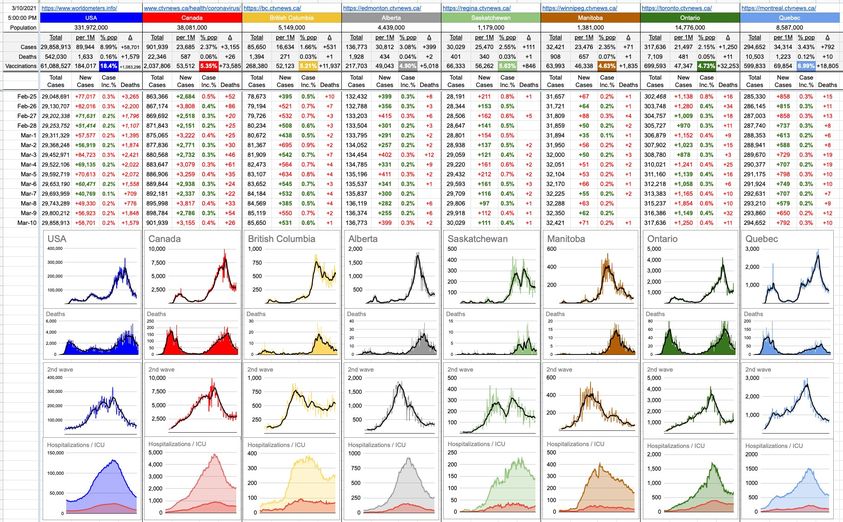There’s a lot to learn from looking at the list of countries who managed to secure significant doses of vaccine early in the game, because it begs a lot of questions. Why are they doing so well? Where did they get it from? Why did they get it and not us?
Starting at the top of the list and sorting by Doses… either by “population percentage with at least one dose” or simply “doses per 100 people” – the results are pretty much the same. There, it makes sense to remove the “big” names because the answer is obvious… those that are making the vaccines are using it for themselves as much as they can. The U.S., the U.K, China, Russia. Also remove from there places whose numbers are skewed because of low populations. The Maldives, the Seychelles… tiny populations, mostly vaccinated.
The top of the list now is of course Israel, who was on top of the list before anyone else was removed. They have a population of 9,000,000. They’ve administered 9,000,000 doses. They’re not all first doses, but most are. I saw a picture of a café in Tel Aviv yesterday… and outdoor patio, crowded, no masks, people having a blast. We’ll be there one day… but they’re there now.
How did Israel do it? A pretty sweet deal with Pfizer – one that worked out well for everyone. Lots of data, lots of healthy people. There are plenty of articles to read about how it all came about.
But who’s next on the list now? A terrific outlier to study, as far as I’m concerned.
Chile… and I’m interested because I was born there. Because I have friends and family there. Because I used to travel down there on an almost annual basis, and I know how things work; I know more about doing business with Chile than anyone would ever want to know… which led me to ask the relevant question… who’d they hustle and how’d they do it? Their population is about half of Canada. 22% of those people have had at least one dose. We’re at 5%.
May of 2020 was a bad month down there… 100,000 new infections and almost 1,000 deaths. That’s when they began taking their vaccine plan seriously. Their ministry of health set up meetings with 11 labs around the world, a number that went down to 5 as talks progressed. Internally, it was agreed that when the health regulators of those jurisdictions approved those vaccines, they’d be auto-approved in Chile. To lock in those supplies, meetings were scheduled *in person*. The Chileans flew out to numerous places, including Abu Dabi and the UAE, principal operational hubs for Pfizer and BioNTech. And this is where the Chilean way of business kicked in. I wasn’t in those rooms, but what I know is that those Chileans did not leave without firm deals to receive vaccine; letters of intent, confidentiality agreements… and, probably, agreements not so different from Israel – yes, for sure, we’ll give you the data… we’ll red-line vaccinations… whatever you need… just get us the stuff, AND, if *you* don’t comply with your end of it, there will be hell to pay, as enforced by whatever international laws apply.
I’m speculating a bit and drawing on my knowledge on how things work, and what sort of leverage (the only sort that could possibly be applied) might have worked… because it ultimately worked, and worked well. Very early in the game, Chile was already ahead. By September of last year, Chile was setting up clinical trials for Sinovac and Janssen. Some 3,000 Chileans happily volunteered between October and November. And, for doing so, Chile locked in a $14/dose cost of vaccine and top of the delivery schedule. Chile stuck to their end of it, and the manufacturers have stuck to theirs. Win-win.
Around here, we’re paying $35/dose, when we can get it. Yes, I know – we’ve all read the same news – we will get it all in due course, and just because we keep getting dropped down the list it doesn’t mean anything. Patience, etc. By the time our anger and head-shaking subsides, the pandemic will be over and we’ll have moved on and nobody will care. But allow me to put it in writing; our government let us down. Good intentions are not good enough. Intention to have enough vaccine in a timely manner. Intention to have an infrastructure for booking appointments. Getting up in front a podium and TV cameras isn’t worth anything if you don’t deliver. Nobody is interested in finger pointing and lame excuses, especially how it’s “out of our control”. Your job as our leaders is to find a way to put it into *your* control. Our control. Many governments around the world, with far less resources at their disposal, managed to navigate this process far better.
Ultimately, I’m familiar with the Canadian way of doing business too. The 300,000,000 doses we’ve procured – in the same way Seinfeld “procured” a car reservation in that famous episode – was done with lots of emails, phone calls, Zoom meetings. Whiteboards and PowerPoints. Lawyers and contracts and back-and-forth mark-ups, with nothing in there that could incur any liability. And with nothing to offer in return, very little teeth in those agreements. How can we be sure they’ll hold up their end? It doesn’t matter… and don’t worry about it because with all the “best efforts” language in there, we have zero recourse anyway. Let’s just hope for the best.
Chile started at the finish line. They simply asked, “What is the fastest way to get vaccines into the arms of our population?”… and assigned a group of intelligent resourceful people to just get it done. And they did. Pisco Sours all around. Salúd.
33 Likes, 3 Shares



Strange that you would choose to celebrate with a PERUVIAN cocktail.
Jajajaja,….. yes,….
Good analysis. While nations like Chile were taking care of business, Justin was taking care of his friends at “WE” and mugging for the cameras. Our politicians likely assumed that the US would take care of vaccinating us the same way they take care of defending us. This is a colossal failure on such an important matter but Canada will likely reward the Liberals with re-election nonetheless. So sad for us…
Bibi is a leader and Pinera is a businessman. Justin T is what? Plain incompetent. It boils down to one thing Leadership!
????????
Totally agree. If you under stand the inner workings of Canadian government, someone was needed to push..HARD.
Enrique Gonzalez
Viva ???????? !
Y no te imaginas cómo está Colombia ????